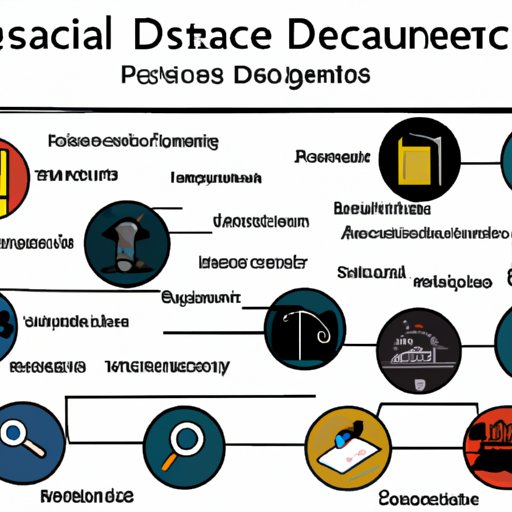
Overview of a Data Science Degree
Data science has become an increasingly popular field in recent years due to its ability to provide insights into complex datasets. As a result, more and more people are considering pursuing a data science degree in order to take advantage of the lucrative career opportunities it provides. But what exactly is a data science degree? What should you expect from a program, and what kind of job opportunities will it open up? Let’s explore these questions and more in this guide to data science degrees.
Definition of Data Science
Before we dive into the specifics of data science degrees, let’s define what data science is. Data science is a field that combines mathematics, computer science, and statistics to analyze large datasets and uncover meaningful insights. It involves using both quantitative and qualitative methods to discover patterns and trends in data that can be used to inform decisions and solve problems. According to the International Council for Big Data Professionals, “Data science is the application of scientific processes, algorithms, and systems to extract knowledge or insights from structured or unstructured data.”
Types of Degrees
There are several different types of data science degrees available. Some of the most common include a bachelor’s degree in data science, a master’s degree in data science, and a PhD in data science. Each type of degree provides a different level of training and expertise. Bachelor’s degrees typically require four years of full-time study, while master’s degrees usually require two years of study. A PhD in data science is the most advanced degree and requires at least three years of research and writing.
Benefits of Pursuing a Data Science Degree
Pursuing a data science degree can provide a variety of benefits. Here are some of the top advantages of earning a data science degree:
Understanding Big Data
Big data is becoming increasingly important in today’s world. With a data science degree, you’ll gain a deep understanding of how to work with large datasets and use them to make informed decisions. You’ll learn how to analyze and interpret data, as well as how to use data visualization tools to present your findings.
Developing Analytical Skills
Data science degrees also help develop analytical skills. You’ll learn how to evaluate and assess data, draw conclusions, and identify correlations between different pieces of information. These skills will be invaluable in any data-related field.
Gaining Technical Knowledge
Data science degrees typically involve a lot of technical courses. You’ll learn the basics of coding and programming, as well as how to use various software applications. This knowledge will help you better understand how data is collected and analyzed, and how to use technology to your advantage.

What to Expect in a Data Science Degree Program
Data science degree programs vary depending on the institution, but there are some common elements. Here’s what you can expect from a typical data science degree program:
Coursework
Most data science degree programs include courses in mathematics, computer science, statistics, and data analysis. You may also take courses in machine learning, artificial intelligence, and other related topics. The exact courses you take will depend on the program and your chosen area of specialization.
Classroom Settings
Classroom settings in data science degree programs range from traditional lectures to online classes. In some cases, you may have the option of taking classes in person or remotely. Depending on the school, you may be able to choose the type of classes you take.
Field Projects
Many data science degree programs require students to complete field projects. These projects may involve working with real-world datasets and analyzing them to find meaningful insights. Field projects provide students with hands-on experience and help them gain valuable skills that can be applied in their professional lives.
Career Opportunities with a Data Science Degree
Earning a data science degree can open up many career opportunities. Here are some of the industries that hire data scientists, as well as the types of jobs they typically offer:
Industries Hiring Data Scientists
Data scientists are in high demand across a variety of industries. Companies in fields such as healthcare, finance, retail, and government all need qualified data scientists. Additionally, many tech companies are looking for data scientists to help develop new products and services.
Job Titles and Salaries
The job titles available to data scientists vary depending on their experience and the industry they work in. Common job titles for data scientists include data analyst, data engineer, and data architect. Salaries for data scientists also vary greatly, but according to the U.S. Bureau of Labor Statistics, the median annual wage for data scientists was $103,590 in 2019.
Finding the Right Data Science Degree Program
When choosing a data science degree program, there are a few things to consider. Here are some tips for finding the right program for you:
Research Different Programs
Take the time to research different programs and compare their curriculums, faculty, and cost. Make sure the program you choose aligns with your goals and interests.
Consider Online Options
Many schools now offer online data science degree programs. If you don’t have the time or resources to attend classes in person, an online program may be a good option for you.
Look at Accreditation
Make sure the program you choose is accredited by a reputable organization. Accreditation ensures that the program meets certain standards and will give you the best chance of success.

Tips for Success in a Data Science Degree Program
Once you’ve chosen a program, here are some tips for ensuring your success:
Build a Strong Network
Networking is key in the data science field. Connect with other students, alumni, and professionals in the industry to expand your network and get advice.
Stay Up-to-Date on Industry Trends
Technology is constantly changing, so it’s important to stay up-to-date on industry trends. Read blogs, attend conferences, and follow leaders in the field to stay ahead of the curve.
Practice Problem-Solving Techniques
Data science is all about problem-solving, so practice your problem-solving skills as much as possible. Work through exercises and practice datasets to hone your skills.
Work on Your Communication Skills
Communication is essential in data science. Practice presenting your findings in a clear and concise manner, and learn how to effectively communicate with colleagues and clients.
Conclusion
A data science degree can open up many career opportunities. With the right program and dedication, you can develop the skills needed to succeed in the field. Consider the tips outlined in this guide when choosing a data science degree program, and remember to practice your problem-solving and communication skills to ensure your success.
(Note: Is this article not meeting your expectations? Do you have knowledge or insights to share? Unlock new opportunities and expand your reach by joining our authors team. Click Registration to join us and share your expertise with our readers.)
